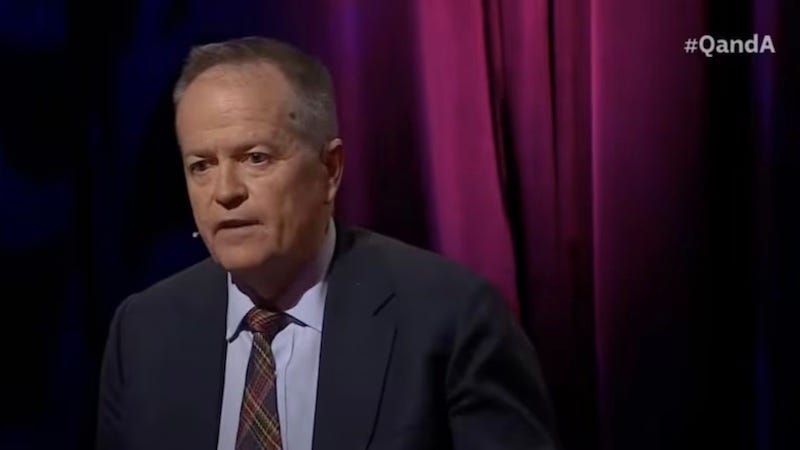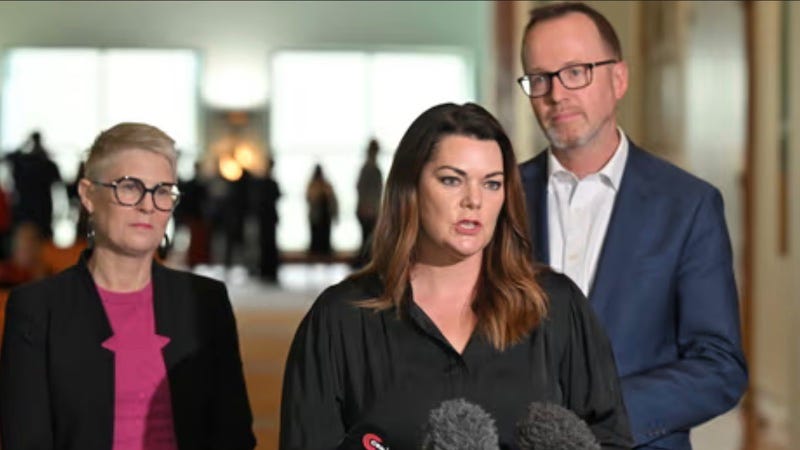The ethical dilemma of using gambling ads to support the worst media in the world
Legislative change is not just an opportunity but a profound responsibility to reshape the media landscape into one that truly serves the public interest.
The debate surrounding the potential banning of gambling advertising and the link with the survival of free-to-air mainstream media is a situation laced with historical vested interests, and the recent remarks by senior government minister Bill Shorten have ignited a broader discussion about the role of government in supporting an industry in decline due to technological disruption, changing consumer habits and its own ineptitude.
Shorten’s comments highlight a dilemma faced by many governments worldwide: the balancing act between regulating harmful industries such as gambling, alcohol and tobacco, and ensuring the viability of traditional media outlets. He candidly acknowledged the severe impact that digital platforms such as Facebook have had on traditional media, especially free-to-air channels, which have seen their advertising revenues plummet as advertisers flock to more targeted and data-rich online platforms. This shift has left traditional media in a precarious position, increasingly reliant on any available sources of revenue, including those from gambling advertising.
This reliance is not only about maintaining profitability: it’s about survival. Shorten’s perspective is that while the ideal situation might be to eliminate gambling advertising due to its societal harms, the reality is that such a move could cripple the already struggling free-to-air media sector. This sector, despite its flaws, is seen by some, including Shorten, as vital for maintaining a diverse media landscape and ensuring access to information, particularly in areas underserved by broadband internet or where people rely on television for news and local content.
Shorten – reflecting the government’s cautious stance on most issues – has framed gambling advertising as a ‘necessary evil’ to prevent a greater loss, which would be the collapse of an entire media sector. His view, however, raises significant ethical questions, as it pits the welfare of a traditional industry against the broader societal impacts of gambling, such as addiction and financial hardship, which are exacerbated by pervasive advertising.
Historically, Australian media has been cushioned by various government policies aimed at shielding it from market and technological pressures. From the legislative protections in the 1980s and early 1990s, to the media bargaining code of 2021, these measures have often been justified as efforts to maintain a healthy, diverse media environment. Critics, however, argue that these protections have served to maintain outdated business models and stifle innovation, and is a form of protectionism that has kept the media industry risk-averse, conservative, and overly reliant on sensationalism and outrage – a far cry from the dynamic and diverse media landscape that modern Australia might expect or require.
Many of the ideas discussed in the post are included in our publication, ‘Fixing Australian Politics: How to change the system of government’, available in paperback or eBook from Amazon.
The evolution of media consumption patterns, with the rise of streaming services and on-demand content, has fundamentally altered how people interact with media. The traditional model of scheduled programming is increasingly irrelevant in a world where viewers are accustomed to watching what they want when they want. This shift raises the question of whether propping up traditional media through gambling revenue is just delaying the inevitable need for these companies to innovate or fundamentally restructure.
This debate about media dependency on gambling advertising is also a reflection of broader societal issues – a paradox in relying on an industry that harms public wellbeing to fund a sector that is meant to serve the public interest, but is only serving its own vested interests. Is the short-term survival of traditional media worth the long-term costs of increased gambling harm? Or is it time to rethink not just the regulations around advertising, but the very nature of the media industry itself in Australia? Is mainstream media an industry worth saving?
Government protection of outdated media models
The historical approach to media regulation and government support in Australia contrasts with broader economic trends, particularly the steady withdrawal of subsidies from other industries. Sectors such as textiles and footwear in the 1970s, and car manufacturing in the 2010s, saw their governmental lifelines cut as part of a broader neoliberalist agenda. Yet, the media industry, particularly free-to-air television, has been consistently shielded from similar fates through various legislative protections and sometimes direct financial interventions, such as the controversial $30 million payment made by the Turnbull government to Murdoch-owned Foxtel in 2017, ostensibly to promote women’s sport, although there is no evidence to support this funding was ever used in this way, and there’s no indication about how this money was spent.
Such protection has led to a media landscape that is not only outdated but also uncompetitive. The slow response to digital trends and the failure to develop new business models have left traditional media in Australia lagging behind their international counterparts, where outlets such as the New York Times and The Guardian have made significant strides in adapting to and capitalising on the digital age.
This, of course, extends to the type of journalism that dominates Australian free-to-air television, which has poor reporting standards and a reluctance to challenge powerful figures and interests. It’s no secret that figures such as Rupert Murdoch and Kerry Stokes wield considerable influence over the Australian media and political landscape, yet government actions often pander more to these media moguls than to the principles of a diverse and dynamic media environment.
The Australian media landscape, as it stands, is not just a relic of past economic policies but also a current example of the government’s failure to adapt to new realities. While there are exceptions such as SBS, which has managed to maintain high standards despite a wide range of political and funding challenges enforced by the government, most of the mainstream media industry is a wasteland of conservative interests in dire need of reform and modernisation.
Government’s role in transforming media ethics
The government’s support of a media industry which has persistent issues around workplace culture, particularly misogyny and racism, as highlighted in a recent exposé on the ABC’s Four Corners, also highlights a deeper problem within this relationship. While Four Corners focussed on the unhealthy and disastrous work culture within Seven West Media, where allegations of protecting problematic figures and fostering discriminatory practices persist, there are systemic problems in all mainstream media outlets, including the ABC, and the continuing support and provision of legislative and financial support from governments cannot rectify this.
Taking this into account, the role of government should move from ensuring the survival of these entities to actively fostering their evolution into more ethical and responsible organisations. The government’s financial lifeline through legislative changes, while crucial for those industries in the short term, offers an unprecedented opportunity to mandate substantial reforms. If government is going to provide this legislative and financial support, why not develop a legislative response that not only preserves jobs and services but also improves the ethical standards, quality and inclusiveness of these media outlets?
The suggestion by the Australian Greens to implement a ‘tech tax’ on major digital platforms such as Meta, Google, Twitter and TikTok, and redirect these funds to support legacy media, is a step in the right direction but it should come with caveats. This approach should not only be about handing over funds to media companies but about tying this financial support to clear, enforceable standards of corporate behaviour and journalistic integrity. This could involve setting higher benchmarks for diversity in hiring practices, enforcing strict anti-harassment policies, and requiring a shift away from sensationalist and divisive content towards more fact-based and inclusive reporting. The mainstream media has shown, historically, that it can’t trusted on any of these areas of diversity, quality, integrity and good corporate behaviour, so why should the public – and governments – tolerate this situation?
This debate about the role of gambling advertising in media financing further complicates the government’s position. While the financial benefits of such advertising are clear, especially in propping up a struggling industry, the ethical implications are profoundly troubling. Gambling advertising, much like tobacco and alcohol advertising in the past, plays a significant role in normalising behaviours that can have destructive personal and social consequences. The argument that these advertisements are a necessary evil to support media operations, as Shorten has suggested, reflects a troubling willingness to compromise public health and welfare for corporate profits.
The government’s approach should focus not on sustaining outdated business models through ethically questionable means but on promoting a transition towards more sustainable and socially responsible media practices. Banning gambling advertising outright, as has been recommended by the cross-party Standing Committee on Social Policy and Legal Affairs, would align with this approach. Historical precedents with tobacco and alcohol suggest that such industries can adapt to advertising restrictions without facing extinction. More importantly, it would signal a commitment to prioritising public welfare over corporate profits, slowing down an industry that thrives on exploitation and reducing the social harms associated with gambling.
By leveraging legislative power to enforce reforms and curbing harmful advertising practices, the government can help foster a media industry that not only survives the digital transition but also emerges as a more inclusive, responsible, and ethical pillar of Australian society. This is not just an opportunity but a profound responsibility – to reshape the media landscape into one that truly serves the public interest. Isn’t this what Labor governments are meant to achieve?







